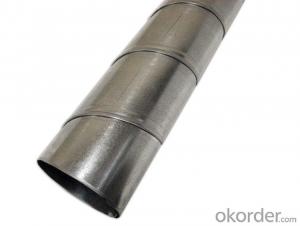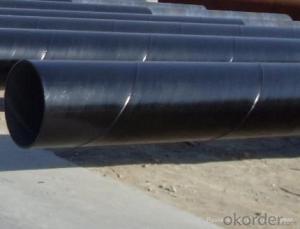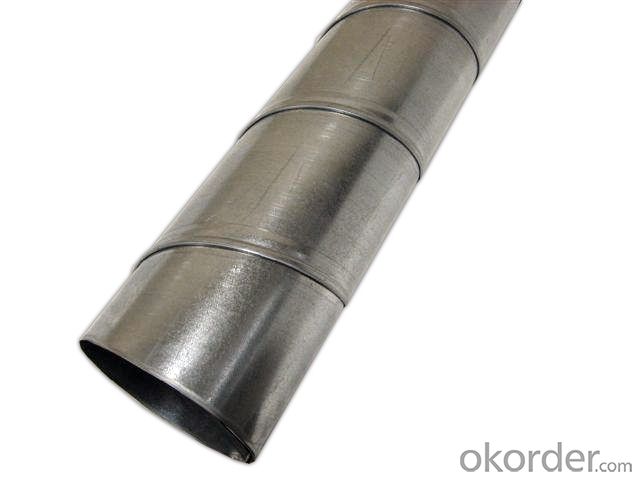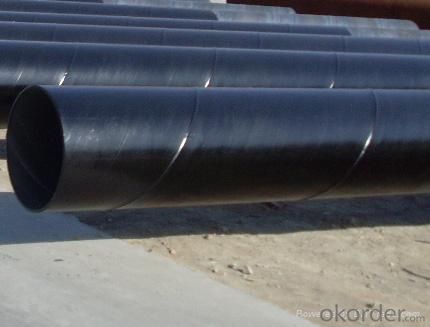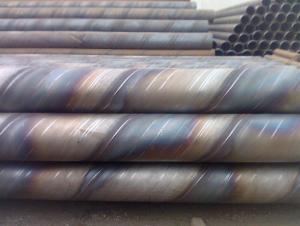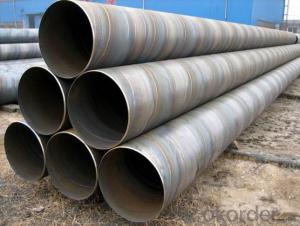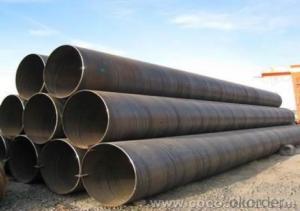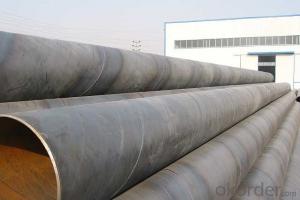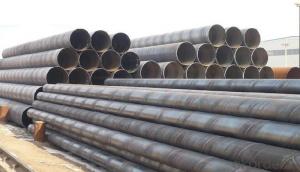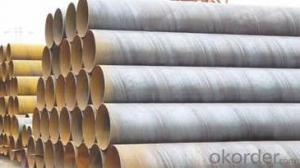SPIRAL STEEL PIPE 24’‘ 26’‘ 28’‘ 32’‘ ASTM API LARGE DIAMETER PIPE
- Loading Port:
- Tianjin
- Payment Terms:
- TT OR LC
- Min Order Qty:
- 5 m.t.
- Supply Capability:
- 3000 m.t./month
OKorder Service Pledge
OKorder Financial Service
You Might Also Like
Packaging & Delivery
Packaging Detail: | standard export packing or as customer's requirement |
Delivery Detail: | within 10 - 30 days |
Specifications
Spiral Welded Steel Pipes and Tubes
1.Material:Q195-Q235
2.Length:1-12m
3.WT:1.0-14mm
4.O.D.:20-273mm
Spiral Welded Steel Pipes and Tubes
Product Description:
1.Material : Q235,Q345,L245,L290,L360,L415,L450,L485,GrB,X42,46,X52,X56,X60,X65,X70,X80,X100
2,Standard: SY/T5037-2000,GB/T9711-2011,API Spec 5L PSL1/PSL2,ASTM A252\A53,ISO3183,DIN17172,EN10217,JIS G3457,AWWA C200,ASTM A139,ASTM A671,ASTM A672
3.Wall thickness: 3.0mm-30mm
4.Outer diameter: φ168mm-3020mm
5,Length: 5m-12m or as your requirement
6,Corrosion protection standard: DIN30670,DIN30671, AWWAC210, AWWA C203, SY/T0413-2002,SY/T0414-2002
7,Application: Oil, gas, natural gas, water pipe, thermal electricity pipe, steel structure engineering, etc
Q195-q345 Material Steel Pipe's Materials
Elements | Chemical Compsition% | Mechanical Property | ||||||
C% | Mn% | S% | P% | Si% | Yield Point (Mpa) | Tensile Strength(Mpa) | Elongation | |
Q195 | 0.06-0.12 | 0.25-0.50 | <0.050< span=""> | <0.045< span=""> | <0.030< span=""> | >195 | 315-430 | 32-33 |
Q215 | 0.09-0.15 | 0.25-0.55 | <0.05< span=""> | <0.045< span=""> | <0.030< span=""> | >215 | 335-450 | 26-31 |
Q235 | 0.12-0.20 | 0.30-0.70 | <0.045< span=""> | <0.045< span=""> | <0.030< span=""> | >235 | 375-500 | 24-26 |
Q345 | <0.20< span=""> | 1.0-1.6 | <0.040< span=""> | <0.040< span=""> | <0.55< span=""> | >345 | 470-630 | 21-22 |
- Q: How are steel pipes used in the automotive manufacturing industry?
- Steel pipes are commonly used in the automotive manufacturing industry for various applications such as exhaust systems, fuel lines, and structural components. They provide durability, strength, and resistance to heat and corrosion, making them ideal for withstanding the harsh conditions of vehicles.
- Q: How much is 4 inches steel tube MM?
- 1 inches =25.4 mm;4 inches =101.6 mm;The specification of steel pipe is usually nominal size;
- Q: Is the PVC tube a plastic tube or a plastic tube?.
- It's plastic tubePolyvinyl chloride (Poly, Vinyl, Chloride, PVC)PVC is a VCM monomer (vinyl, chloride, monomer), in peroxide, azo compounds and other initiators;
- Q: How are steel pipes coated to prevent corrosion?
- To prevent corrosion, steel pipes can be coated using different methods and materials. One common approach is to apply a protective layer of paint or epoxy on the pipe's surface. This coating acts as a barrier between the steel and the external environment, preventing direct contact with moisture and corrosive substances. Another technique involves galvanization, where the steel pipes are coated with a layer of zinc. Zinc is highly resistant to corrosion and acts as a sacrificial anode. In case of any damage to the coating, the zinc corrodes instead of the steel, ensuring the steel remains intact and free from corrosion. Polyethylene or polypropylene materials can also be fused onto the steel surface, creating a strong bond that provides excellent resistance against corrosion. This method, known as fusion bonding, is commonly used in offshore and underground pipelines. Moreover, a layer of corrosion-resistant alloy can be applied to the steel pipe. This alloy is typically a combination of metals such as nickel, chromium, and molybdenum, which offer superior protection against corrosion in harsh environments. The choice of coating method depends on factors like operating conditions, the presence of corrosive substances, and the expected lifespan of the steel pipes. By effectively applying these coatings, steel pipes can be safeguarded against corrosion, extending their durability and ensuring the integrity of the infrastructure they are used in.
- Q: Can steel pipes be used for underground water supply systems?
- Yes, steel pipes can be used for underground water supply systems. Steel pipes are durable, strong, and resistant to corrosion, making them suitable for underground applications. They can withstand high water pressure, provide efficient flow of water, and have a long lifespan. However, it is important to ensure that the steel pipes are properly coated and protected against corrosion to prevent any contamination of the water supply. Additionally, steel pipes are heavier than other materials, which may require additional support during installation. Proper maintenance and regular inspection are also crucial to identify any potential issues and prevent leaks or damage to the underground water supply system.
- Q: Can steel pipes be used for conveying abrasive materials?
- Yes, steel pipes can be used for conveying abrasive materials. Steel pipes are known for their durability and resistance to wear, making them suitable for handling abrasive materials. Additionally, steel pipes can be lined with various protective coatings or linings to further enhance their resistance to abrasion and extend their lifespan.
- Q: Difference between cold rolled steel pipe and common steel pipe
- From the above point of view, the hot rolled steel pipe used in fluid transport, mechanical structure and other requirements of the size of the situation is not high, cold-rolled steel pipe used in precision instruments, hydraulic systems, pneumatic and other places demanding.
- Q: Are steel pipes suitable for use in hydropower plants?
- Yes, steel pipes are suitable for use in hydropower plants. Steel pipes offer excellent durability, strength, and resistance to corrosion, making them ideal for transporting water or other fluids in hydropower systems. Additionally, steel pipes can withstand high pressure and provide efficient flow rates, ensuring reliable and efficient operation of the hydropower plant.
- Q: What is the maximum pressure that steel pipes can handle?
- The maximum pressure that steel pipes can handle depends on various factors such as the grade of steel, pipe thickness, and diameter. However, in general, steel pipes can handle pressures ranging from a few hundred psi (pounds per square inch) to several thousand psi.
- Q: Can steel pipes be used for underground air supply systems?
- Yes, steel pipes can be used for underground air supply systems. Steel pipes are often used in underground applications due to their strength, durability, and resistance to external factors such as corrosion and impact. They can withstand the pressure and temperature requirements of air supply systems and can be easily installed underground. Additionally, steel pipes have a long lifespan, making them a cost-effective choice for underground air supply systems. However, it is important to consider factors such as soil conditions, potential for corrosion, and local regulations when selecting the appropriate steel pipes for the specific underground air supply system.
Send your message to us
SPIRAL STEEL PIPE 24’‘ 26’‘ 28’‘ 32’‘ ASTM API LARGE DIAMETER PIPE
- Loading Port:
- Tianjin
- Payment Terms:
- TT OR LC
- Min Order Qty:
- 5 m.t.
- Supply Capability:
- 3000 m.t./month
OKorder Service Pledge
OKorder Financial Service
Similar products
Hot products
Hot Searches
Related keywords
